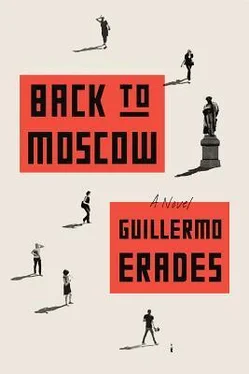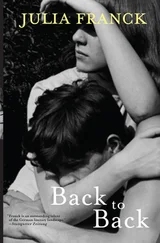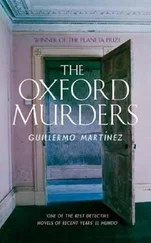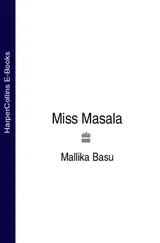The sky was brighter now, almost blue, but the sun didn’t seem powerful enough to dissipate the late autumn chill. As I marched among the towering constructions of the New Arbat, I remembered how, on a previous stroll, I had been told that the large buildings on the southern side were meant to represent open books. Each structure was formed by two flat wings joined at a wide angle, but, as far as I could see, nothing else in their design suggested the shape of a book. Glancing at their plain façades, I now wondered if the architect’s intention had really been to emulate books or if, more likely, the alleged resemblance had been an afterthought.
I sat for a while in the Internet café in Okhotny Ryad, read the news, answered long-overdue emails. Back in the street, the air seemed even cooler.
I reached Lubyanka with some twenty minutes to spare. At dawn, just before saying goodbye, Lena and I had agreed to meet outside Dyetsky Mir, the big toyshop on the northwestern side of the square. To warm myself a little, I entered the shop. The spacious central atrium was deserted. I wandered among rows of plastic cars, skates, balls, dolls, stuffed animals. A couple of shop assistants hid behind the stands, avoiding eye contact with customers, as was the practice in Moscow. I passed through the bicycle section and, thinking that my legs could do with a rest, sat on a child-size stool near the entrance. Next to the stool, a low table was covered in piles of small plastic bricks, identical to those I’d played with in my childhood. I gathered a few colourful pieces and, without giving it much thought, began interlocking the bricks to form a wall. I then built four corners, joined them into a square which could serve as the base of a tower. I kept adding bricks, layer by layer, enjoying the simplicity of the task, trying not only to create a solid foundation for my tower, but also to match the colours in symmetrical patterns as the structure grew taller.
‘Do you need more time to finish?’
I looked up. Lena was wearing a dark green anorak and tight jeans. Her blonde hair was airier than the night before.
I wasn’t sure how much time I’d spent playing with the bricks. I stood up, awkward and embarrassed. ‘I thought we were meeting outside,’ I said. ‘What’s the time?’
Lena stared at me in silence, her blue gaze so intense that I had to look away, afraid she could read my thoughts.
‘Come with me,’ she said finally. ‘I’m going to show you my favourite place in Moscow.’
She grabbed my arm and walked me out of the shop. As we crossed the street through the underground passage they called perekhod, I told her about my unusual Russian lesson in the morning, and how Nadezhda Nikolaevna and I had been kicked out of the café.
‘Moscow is changing,’ Lena said. ‘In soviet times, communism gave us values to live by, a sense of community. People helped each other. That’s gone now.’
She spoke deliberately, aware of my language limitations. I was glad to notice that, in broad daylight, without vodka, I still understood most of what she said.
‘Russia is lost,’ she continued. ‘People here need guidance. First we had God. Then we had Lenin. Now we have nothing.’
We emerged on the other side of Lubyanka.
‘See that?’ Lena was now pointing at the square. The enormous roundabout was circled by dozens of vehicles that poured in from all over Moscow. Across the square, opposite the dreamy world of Dyetsky Mir, stood the infamous headquarters of the secret services, where, I had been told, thousands of people had been tortured and murdered.
‘The Lubyanka building,’ I said, nodding, frowning, trying to convey my understanding of the historical suffering associated with the building.
‘Not that,’ Lena said. ‘I mean in the middle of the roundabout. What do you see?’
All I saw among the fuming vehicles was an empty traffic island.
‘Nothing,’ I said.
‘Exactly. There used to be a statue. Dzerzhinsky, founder of the soviet secret services.’
‘I see.’
‘The statue disappeared with the perestroika,’ Lena said. ‘It was never replaced. That’s what I mean: after the fall of communism, Russia’s soul is empty, like Lubyanka Square.’
We walked along Nikolskaya, then turned left into a narrow side street crammed with double-parked cars. I had visited these old streets of Kitay-gorod at night with the brothers, searching for clubs, but in daylight the entire neighbourhood felt like part of a different, sleepier city. Lena stopped in front of a residential building that had no signs.
‘Here we are,’ she said, indicating a brown metal door.
She rang a bell and the door was opened. Descending a flight of stairs, we entered a dimly lit underground room. A young bearded man with a ponytail sat behind a counter, reading in near darkness. He greeted Lena with a curt nod, seemingly annoyed by our interruption, and reluctantly placed his book on the counter next to a burning incense stick. The counter was covered with cheap booklets on Buddhism, Taoism, meditation, yoga. All the books bore handwritten price tags.
We removed our shoes and handed over our coats. Lena was wearing a white woollen jumper. At the sight of her curves, I had a sharp feeling of inadequacy — as if Lena were a real woman and I were just a boy pretending to be a man.
We were led into a larger underground room — the only light provided by candles flickering in the dark. The candles stood on eight or nine low tables, each of which was surrounded by piles of cushions. The floor was covered with rugs from wall to wall, giving the entire setting a gloomy oriental feel. All the tables were unoccupied, except one at the far end, where another couple cuddled and spoke in murmurs.
Lena placed our order with the bearded man. We sat among the cushions, our backs leaning on the wall. Gentle sitar music filled the air. The atmosphere was sepulchral, holy.
I put my arm around Lena. She leaned her head on my shoulder. Absorbing the sweetness of her perfume, my mind flashed back to Propaganda. An hour or so after we’d met by the bar, I had followed Lena outside the club, through a side alley, into an old building. After climbing a few flights of unlit stairs impregnated with the stench of cat piss, I had found myself perched on a rooftop — Lena was showing me the night-time view over Moscow. Look how beautiful and special this city is, she’d said. It was dark and cold, and I was wasted, but I understood what she meant.
A waitress in a kimono slid into the room carrying our tray and kneeled at our table. The tea ceremony Lena had ordered involved hot water being poured from a large jar into the teapot, from the teapot into thimble-sized cups, then all back to the jar. The circulation of steaming water had a hypnotic effect on me. At some point, tea leaves were ceremoniously added to the teapot and, after a minute or so, we were presented with two tiny cups of green tea. Lena grabbed her cup with two hands, bowing slightly, and expertly placed it under her nose. ‘Beautiful,’ she said.
I lifted my cup with the tips of my fingers. The tea had a damp-earth aroma and, once in my mouth, a faint taste of mud.
‘I love this place,’ Lena said after the kimono lady was gone. ‘So quiet and peaceful, you wouldn’t believe we are in the centre of Moscow.’
Lena spoke in whispers, which made the sound of her Russian serene, soothing.
‘Moscow is full of surprises,’ I said.
‘Moscow is the best place in the world. The city has its own cosmic energy, you can feel it through your entire body.’
Lena took care of refilling our teacups. As I took a sip, I felt the strength draining away from my limbs. I placed my cup on the table and lay down among the oriental cushions, my head on Lena’s thigh. Lena stroked my hair, her nails making sweet ripples through my skin. There was a reassuring tranquillity about Lena’s presence, her mellow voice and graceful gestures. It was as if her body had a different density and she were forced to move in slow motion.
Читать дальше












